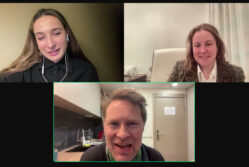
Front Lines of War Depicted in Documentary
by Sonya K. Fry
Journalism in times of war is an increasingly lethal vocation. Two journalists were killed in WWI and 63 lost their lives in WWII, but now, in the past two decades, at least one journalist a week has been killed, with the dead now numbering in the thousands. In addition to facing death, kidnapping, torture and beheadings are now part of the job description.
Writer/director Martyn Burke has made several documentaries about war for PBS, HBO and TNT. Anthony Feinstein is a psychiatrist, trained in South Africa and London and is now at the University of Toronto. He has been a spokesman for major networks about the psychological cost of covering war.
Their documentary, “Under Fire: Journalists in Combat,” which opened in December, weaves together combat footage with first-hand accounts by journalists who reveal what they saw, thought and felt as they confronted both the savagery of war and the insatiable 24-hour news cycle.
In many cases the journalist is ransomed for a price, but the native fixer/translator/driver is tortured or killed which adds to the guilt that the captured journalist endures. The term post-traumatic stress disorder (PTSD) is now being given to the symptoms of depression, anxiety and substance abuse that journalists as well as combatants suffer. Jon Steele of ITN (England) and author of War Junkie puts it this way in the film “We didn’t call it PTSD back then, we called it ‘I need a drink.’”
The many repercussions of war are discussed in the film from Christina Lamb of The Sunday Times (England) “It seemed really, really stupid to die in that field in Afghanistan.” to Chris Hedges, formerly of The New York Times “In the same way a drug physically breaks down an addict, I was being broken down by war.” Other journalists included in the film are Finbarr O’Reilly, a Reuters photojournalist, Ian Stewart, former AP Bureau Chief in West Africa and Anthony Loyd, U.K. war correspondent for The Times among others.
The film and discussion are co-sponsored by International News Safety Institute, the OPC and Columbia Graduate School of Journalism. Following the film Dr. Anthony Feinstein will talk about the documentary and conduct a Q&A.
The film will start at 6:30 p.m. Thursday, January 19 at the Columbia Graduate School of Journalism located at 116th Street and Broadway. Enter Columbia through the 115th Street gate, make a sharp left toward the imposing limestone building with the statue of Thomas Jefferson in front. Climb the steps, enter the lobby and turn left into the Stabile Student Center.
RSVP to the OPC office by calling 212-626-9220 or e-mail.
Related Events


